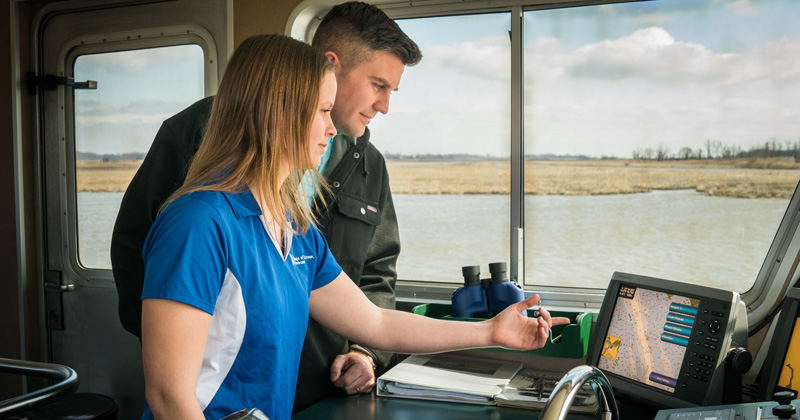

The connection between science and policy
Photo by Michael Graw July 20, 2018
UD graduate student explores fisheries management through Delaware Sea Grant-facilitated internship
If you’ve ever taken a fish oil supplement, chances are you’ve come in contact with Atlantic menhaden, a silvery fish that can be found along the East Coast of the United States and into Nova Scotia. Since the 1800s, menhaden have been used in fertilizer, animal feed and dietary supplements. Today menhaden byproducts are used in everyday merchandise, too, including lipstick and salad dressing.
Part of the herring family, Atlantic menhaden are considered an extremely important regional fishery. In Lewes, Delaware, Atlantic menhaden are a keystone species that form an important part of the marine food chain, especially as a food source for osprey and predatory fish such as striped bass, bluefish and weakfish.
Through an internship with the Delaware Department of Natural Resources and Environmental Control (DNREC), University of Delaware graduate student Lane Johnston got a “behind the scenes look” at how DNREC effectively manages the population of this important species in Delaware’s local waters.
The opportunity to work with DNREC grew out of a conversation with Jennifer Merrill, then the research manager for Delaware Sea Grant (DESG). Johnston, a master’s student studying marine behavioral ecology, shared her interest in learning more about fisheries management policy issues and how information is exchanged with the community, and Merrill helped secure DESG funding for Johnston to work under the guidance of Ed Hale, a biometrician in DNREC’s Division of Fish and Wildlife. Their work together was featured in DESG’s annual report, which was released at the end of June, as an example of how the organization helps create opportunities to train the next generation of marine scientists and policymakers.
At DNREC, Hale and others develop technical reports based on data such as age, growth and abundance that the state collects. The data is incorporated into fishery models that managers use to evaluate, predict and manage a stock of fish, factoring in commercial catch and federal estimates for recreational catch and stakeholder input from public meetings.
“My goal was to expose Lane as broadly as possible to the technical end of fisheries management, including how we collect and analyze data, and how that data is used,” said Hale.
During her internship, Johnston helped conduct field surveys, met with fisheries biologists and heard public concerns. It has been fascinating, she said, to explore how hard science can influence policy decisions.
“Scientists and policy people do not always speak the same language,” Johnston said. “My goal is to understand both sides and to be able to effectively communicate to each side.”
According to a 2015 report by the National Oceanic and Atmospheric Administration’s National Marine Fisheries Service, the state of Delaware generated close to $6.7 million in commercial landings and over $100 million in sales associated with recreational fishing expenditures. Fisheries create jobs, too, at bait shops, gas stations and boat yards, among other places across the broader economy, Hale said. Nationally, U.S. commercial fishing, the seafood industry and recreational fishing supports 1.6 million full- and part-time jobs.
A major focus of Johnston’s work has been creating and maintaining a blog to communicate DNREC’s fisheries work to the public. The blog follows her experience learning how science and hard data is turned into management strategies, specifically, how fisheries data becomes the guidelines and rules for how marine resources are effectively and sustainably managed. Early blog topics have included a history of the Atlantic Menhaden fishery, why fish biological data is important, and how data is collected and used to make stock assessment models and implement fishing regulations.
“This is where partnerships like this really pay dividends – helping students gain experience in different positions to inform their career choices, while providing a new delivery mechanism to communicate the department’s work to the broader public,” said Hale.
About Delaware Sea Grant
The University of Delaware was designated as the nation’s ninth Sea Grant College in 1976 to promote the wise use, conservation and management of marine and coastal resources through high-quality research, education and outreach activities that serve the public and the environment. UD’s College of Earth, Ocean, and Environment administers the program, which conducts research in priority areas ranging from aquaculture to coastal hazards.
Contact Us
Have a UDaily story idea?
Contact us at ocm@udel.edu
Members of the press
Contact us at 302-831-NEWS or visit the Media Relations website


